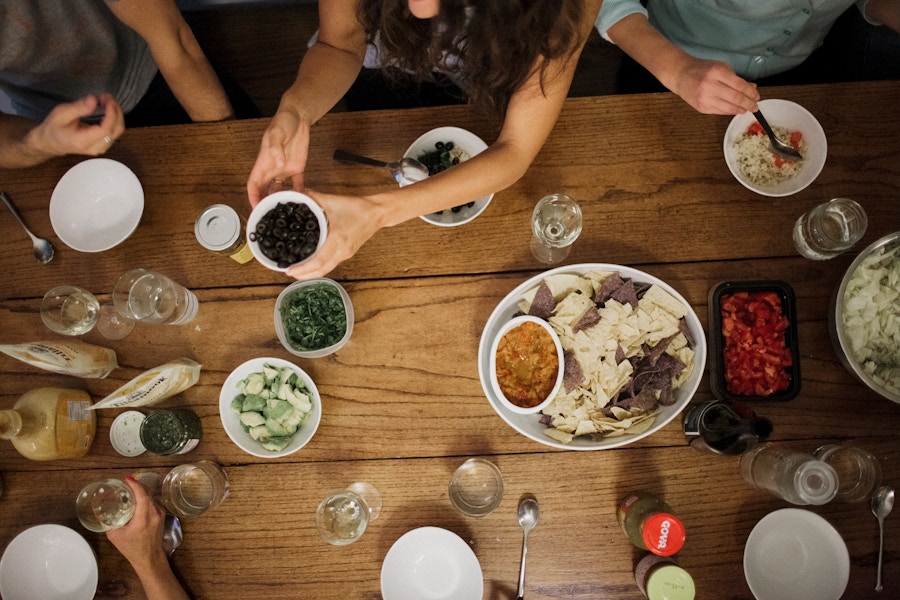There is a Tex-Mex restaurant in Houston I have visited on three occasions. Each meal has begun with chile con queso. The cheese at this particular restaurant is the most delicious food I have ever tasted.
With every bite, I have been overcome with gratitude to God for creating taste buds, cows, and human ingenuity. And that gratitude has led to praise.
Some folks understand this. Some think I’m kidding. And others are skeptical that such a carnal thing as a Tex-Mex appetizer could provoke genuine worship.
We Christians have a long history of mixed and sometimes openly hostile attitudes toward sensual pleasure. Saint Augustine is the fourth-century poster boy for our dilemma, struggling in Book X of his Confessions to rein in each of his five senses. He attempts, for example, to “take food at mealtimes as though it were medicine” and to “fight against the pleasure in order not to be captivated by it.”
Augustine is ever-vigilant that pleasure in created things never replace our desire for the Creator. His caution is well taken. But lately I’ve been discovering an emphatically propleasure voice in the writings of another Christian guide.
C. S. Lewis is known, of course, as a literary scholar, novelist, and apologist. He is also, consistently, a curator of pleasure. Where there is beauty to be received, music to be heard, laughter to be welcomed, and (especially) food to be eaten, Lewis attends, celebrates, scrutinizes, describes, and partakes.
In Letters to Malcolm: Chiefly on Prayer, Lewis argues that the pleasures derived from forest moss and sunlight, bird song, morning air, and the comfort of soft slippers are “shafts of [God’s] glory as it strikes our sensibility.” Our task is not to guard against sensual enjoyment, but to allow our minds to run “back up the sunbeam to the sun” — to see every pleasure as a “channel of adoration.”
Lewis even argues that there is no such thing as a “bad” pleasure — only pleasures “snatched by unlawful acts.” But he is not blind to the “concupiscence” (lustfulness) that so haunts Augustine. When our response to pleasure is greed instead of adoration — when we seek to grasp and possess rather than receive — our healthy cry of “This also is Thou” distorts into “the fatal word: Encore.”
In his introduction to The Four Loves, Lewis distinguishes between “Need-pleasures” and “Pleasures of Appreciation.” The enjoyment we feel upon receiving a Need-pleasure — water to quench thirst, for example, or the scratching of an itch — is intense but short-lived. But with Appreciation-pleasures — nonessential things that awaken us to delight, like delicious smells and tastes and scenes of beauty — the sensation intensifies over time. Greed — the repeated cry of “Encore!” to, say, rich black coffee or extra-creamy queso — may transform a Pleasure of Appreciation into a Pleasure of Need, draining out of it all the lasting enjoyment.
The answer, Lewis contends, is not to avoid pleasure but to “have” and “read” it properly: to receive it, openhanded, as both a gift and a message. “We know we are being touched by a finger of that right hand at which there are pleasures for evermore. There need be no question of thanks or praise as a separate event, something done afterwards. To experience the tiny theophany” — the small sign of God’s presence — “is itself to adore.”
In many respects, Augustine and Lewis are arguing two sides of the same coin. But there is a major point of divergence at the heart of their opposite orientations to pleasure. Where Augustine sees our sensuality as a liability to be managed until God “consign[s] both food and belly to destruction,” Lewis views every earthly pleasure as an apprenticeship in adoration for the sort of thing that will go on forever in heaven.
Biblical writers seem irresistibly drawn to an image — part metaphor, part promise — of “the sacred meal with God.” From the table prepared for the psalmist (Ps. 23:5), to Jesus’ story of a great banquet (Luke 14:15 – 24), to the Revelation 19 vision of a wedding supper, the Scriptures are filled with the anticipation of feasting together — in the presence of God — forever. The prophet Isaiah (25:6 – 8) takes particular pleasure in this vision:
On this mountain the Lord Almighty will prepare a feast of rich food for all peoples, a banquet of aged wine— the best of meats and the finest of wines. On this mountain he will destroy the shroud that enfolds all peoples, the sheet that covers all nations; he will swallow up death forever.
For Lewis, earthly meals are chances to practice the gratitude and adoration that will accompany our everlasting feast with God. Just as trials train us in patience, pleasure trains us in worship. Every sensual enjoyment (properly received) is a “tiny theophany” — a chance to “taste and see” that God is good, and a reminder that there is a whole lot more where that came from.
I rest my queso.
Photo Copyright: Alexander Mychko


